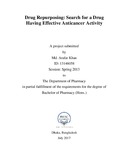| dc.contributor.advisor | Kabir, Dr. Eva Rahman | |
| dc.contributor.author | Khan, Md. Arafat | |
| dc.date.accessioned | 2018-01-31T04:14:09Z | |
| dc.date.available | 2018-01-31T04:14:09Z | |
| dc.date.copyright | 2017 | |
| dc.date.issued | 2017-07-26 | |
| dc.identifier.other | ID 13146058 | |
| dc.identifier.uri | http://hdl.handle.net/10361/9300 | |
| dc.description | This project report is submitted in partial fulfilment of the requirements for the degree of Bachelor of Pharmacy, 2017. | en_US |
| dc.description | Cataloged from PDF version of project report. | |
| dc.description | Includes bibliographical references (page 67-73). | |
| dc.description.abstract | In search of finding better and safer drugs and due to the high cost and decreasing productivity of novel drug discovery programs, scientists are now becoming more interested in finding new therapeutic indications for the existing drugs, popularly known as drug repurposing. In drug repurposing, a conventional drug is used to cure a condition which was not earlier known to be therapeutically effective. Many drugs which have failed clinical trials as they were not effective in their intended therapeutic indication have been repurposed. As a result they have led to huge fortune for the pharmaceutical industries. For instance, sildenafil failed its clinical trials and was repurposed and currently in use as a repurposed drug. Many methods are available for drug repurposing but computational docking is a very cheap and convenient method for drug repurposing which uses computer software to find a possible binding site of a drug within a protein. For its advantages, computational docking approach was used for the present drug repurposing study of mTOR protein, where the drugs chosen were metformin, aspirin and rosuvastatin. Autodock Vina and PyMol was used to complete the study and it was found that aspirin and metformin have poor affinity (-5.8 kcal/mol) for this protein which is upregulated in various types of cancer such as- breast cancer and ovarian cancer. On the other hand, rosuvastatin was found to have a high affinity (-7.8 kcal/mol in case of flexible docking and -10.2 kcal/mol in case of rigid docking) for mTOR and binds to the same binding pocket where the immunosuppressant and anticancer drug rapamycin binds. The study indicates that rosuvastatin might have significant immunosuppressive and anticancer activity by downregulating the activity of mTOR and needs further studies to prove it. | en_US |
| dc.description.statementofresponsibility | Md. Arafat Khan | |
| dc.format.extent | 73 pages | |
| dc.language.iso | en | en_US |
| dc.publisher | BRAC University | en_US |
| dc.rights | BRAC University project reports are protected by copyright. They may be viewed from this source for any purpose, but reproduction or distribution in any format is prohibited without written permission. | |
| dc.subject | Drug repurposing | en_US |
| dc.subject | Anticancer activity | en_US |
| dc.subject | Drug effective | en_US |
| dc.title | Drug Repurposing : search for a drug having effective anticancer activity | en_US |
| dc.type | Project report | en_US |
| dc.contributor.department | Department of Pharmacy, BRAC University | |
| dc.description.degree | B. Pharmacy | |

